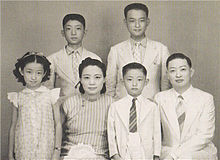Mei Lanfang
Template:Infobox Chinese-language singer and actor Template:Chinese name
Mei Lanfang (simplified Chinese: 梅兰芳; traditional Chinese: 梅蘭芳; pinyin: Méi Lánfāng; October 22, 1894 – August 8, 1961) was one of the most famous Peking opera artists in modern Chinese history, exclusively known for his Dan roles (female role). Specifically, he portrayed Qingyi roles, a type of Dan role in which the female is typically young or middle-aged and is very gentle and elegant. Mei Lanfang is his stage name, and in Chinese it is generally considered a feminine name. His real name was Méi Lán (Chinese: 梅兰). Mei, Shang Xiaoyun, Cheng Yanqiu and Xun Huisheng were known as Four Great Dan in the golden era of Peking Opera.
Biography
Mei was born in Beijing in 1894 into a family of Peking opera and Kunqu performers (performers of a traditional Chinese theatre composed of drama, ballet, opera, poetry, and music) of Taizhou, Jiangsu ancestry. He made his stage debut at the Guanghe Theatre in 1905 when he was 11 years old.[1] In his 50-year stage career, he maintained strong continuity while always working on new techniques. His most famous roles were those of female characters; skillful portrayal of women won him international acclaim, and his smooth, perfectly timed, poised style has come to be known in opera circles as the "Mei School." He also played an important part in continuing the performance tradition of Kunqu, noted particularly for his interpretations of Du Liniang (杜丽娘; in The Peony Pavilion) and Bái Sùzhēn (白素贞; in Legend of the White Snake) and Beauty Yu (in Farewell My Concubine). Mei's famous portrayal of Beauty Yu was so historically moving that Wenting Song say he is one of the greatest vocal artists in modern China.[2]
Mei was the first artist to spread Beijing Opera to foreign countries, participating in cultural exchanges with Japan, the United States, and other regions. He toured the world, forming friendships with the western contemporaries of his day, including Charlie Chaplin. In 1930 he toured North America, visiting Hollywood, where he welcomed by Douglas Fairbanks and Mary Pickford.[3] In 1935, Mei toured Europe, playing to appreciative audiences in Berlin and Moscow. Seeing Mei perform especially impressed the German playwright Bertold Brecht and influenced his concept of the alienation effect.[4]
In July 1937, the Marco Polo Bridge Incident occurred, and the Imperial Japanese Army soon occupied Beijing. The commander of the Japanese Army ordered Mei to perform for them and appointed Mei to a high rank official position. But Mei refused to sing throughout the duration of the war and endured an impoverished lifestyle until the war ended in 1945.

After 1949 he served as director of China Beijing Opera Theater, director of the Chinese Opera Research Institute, and vice-chairman of China Federation of Literary and Art Circles. Besides his autobiography, Forty Years of Life on the Stage, several of his articles and essays have been published in The Collected Works of Mei Lanfang. Recordings of his best-known performances have been published in A Selection of Beijing Operas Performed by Mei Lanfang. In 2000, the story of his life was filmed in a documentary entitled The Worlds of Mei Lanfang. Acclaimed director Chen Kaige directed Forever Enthralled, a film biography of Mei's life, released in December 2008.
Volunteer Work
In 1924, Mei went to Japan after hearing about a large earthquake that had caused destruction. During his stay, he not only performed, but he also donated to help the cause.
Married Life

In the year 1910, Mei married an opera actress named Wang Minghua, and they eventually had one son and one daughter together. While still married to Wang, he married his second wife in 1921, who was also an opera actress. Her name was Fu Zhifang and together, they had nine children. In 1925, he began seeing a third woman, who was also an actress. They had lived together, unmarried, for five years before they had broken up.
In popular culture
In 2009 the Chinese Google homepage displayed a logo commemorating his 115th birthday on October 22.[5]
Notes
- ^ Folk cultural heritage recalls national memory, People's Daily Online, February 14, 2006.
- ^ Joshua Goldstein, "Mei Lanfang and the Nationalization of Peking Opera, 1912-1930," positions: east asia cultures critique 7.2 (2009): 377-420.
- ^ Mark Cosdon, ""Introducing Occidentals to an Exotic Art": Mei Lanfang in New York," Asian Theatre Journal 12.1 (1995): 175-189.
- ^ Bertolt Brecht translated by Eric Bently, "On Chinese Acting," The Tulane Drama Review 6.1 (1961): 130-136.
- ^ Google Mei Lanfang logo
References
- The Editors of Encyclopædia Britannica. "Mei Lanfang." Encyclopedia Britannica Online. Encyclopedia Britannica, 30 Sept. 2014. Web. 06 Mar. 2016.
- Wilson, Charles. "What Is Kunqu Theatre." What Is Kunqu Theatre. Wintergreen Kunqu Society, n.d. Web. 07 Mar. 2016.
- "Traditions - Folk Art." Roles in Peking Opera. Cultural China, n.d. Web. 08 Mar. 2016.
- "梅兰芳." (中国京剧表演艺术家)_百度百科. Baidu, n.d. Web. 09 Mar. 2016.
- Min Tian, Mei Lanfang and the Twentieth-Century International Stage: Chinese Theatre Placed and Displaced (New York: Palgrave, 2012).
